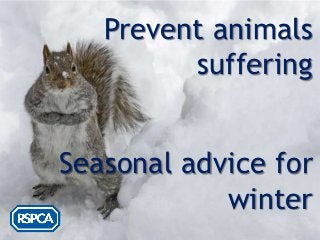
RSPCA - Prevent Animal Suffering
- 1. Prevent animals suffering Seasonal advice for winter
- 2. Seasonal advice for winter During a cold snap we are on full alert, ready to deal with a variety of animals affected by the cold weather. But you can also do your bit to prevent animals suffering.
- 3. Frozen ponds - dos and don'ts If you have a pond, make sure you check it every day for ice, as toxic gases can build up in the water of a frozen pond. These may kill fish or frogs that are hibernating at the bottom. If a pond freezes over, carefully place a saucepan of hot water on the surface to gently melt a hole in the ice. Never tip boiling water straight onto the pond or break the ice with force, as this can harm or even kill any fish living there. Dog owners must keep their pets well away from ponds and lakes that are iced over. Thin ice may break under a dog's weight. Also watch out for dogs' paws becoming impacted with snow - this can cause them discomfort.
- 4. Feeding birds Don't forget to look after the wildlife in your garden. In winter, birds may have difficulty finding normal food supplies such as berries, insects, seeds, worms and fruit. An extra titbit from your kitchen will help to keep them going.
- 5. Extra special care for your pets Pets need extra special care during the chilly winter months. Keep a close eye on outdoor pets, such as guinea pigs and rabbits. Put extra bedding in their home and be prepared to move them into a shed or unused garage for extra shelter whilst the weather is cold.
- 6. Extra special care for your pets Try to maintain a regular routine with your dog. Although you may not feel like taking your dog for a walk on dark wintry evenings, the exercise will keep your pet happy and healthy and will help to keep you fit as well! Remember: Always wear reflective clothing to make yourself visible when walking near roads in the dark. And don't forget your pets too - fit your dog with a reflective collar.
- 7. Extra special care for your pets We advise that if horses and ponies are kept outside during the winter they must have access to shelter at all times. They also need a constant supply of fresh water (check that ice hasn’t formed on it) and a rug to protect them against the cold and wet. Extra food will be needed too, as winter grazing provides very little nourishment. Read more winter care advice for horses. For more pet care advice, see our pets and horses pages
- 8. Fireworks during the festive season Domestic pets, farm animals and wildlife can all suffer as a result of the noise created by loud fireworks. Every year we have to deal with hundreds of calls regarding firework related incidents, such as terrified pets that have bolted or accidents that could easily have been avoided.
- 9. Christmas - Dos and don'ts Deck the halls with boughs of holly - but don't forget that many plants are poisonous, including yew, ivy berries and poinsettia. Prickly Christmas trees are dangerous too, if dogs are attracted to their needles. Give your pets a treat, but remember that too much rich food isn't good for animals. Some seasonal foods, such as grapes, sultanas and raisins are toxic to dogs, and chocolate can actually kill them (doggy chocolate drops made especially for pets are fine though).
- 10. Christmas - Dos and don'ts Splinters of poultry bones are also dangerous to dogs and cats, as they can become stuck in their throats or even pierce their intestinal tract. Don't ignore your pets' needs while you’re celebrating - try to keep to a regular routine of feeding and exercising them.
- 11. We wish you and your pets a safe and happy Christmas. Thank You
